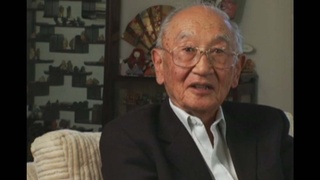Interviews
Ostracized by the camp newspapers
The camp newspaper The Sentinel, they were really bashing us. They were calling us stupid, idiots, uh crazy, you know mad and everything. Because the uh, uh associate editor who was doing writing was a past president of the JACL in Pasadena, Nobu Kawai. And uh, (clears throat) and yeah it was about three four issues there that they were really uhh, calling us all kinds of names. As did the citi- Pacific Citizen, JACL paper. In fact the JACL paper uh, Sabruo Kito I guess was the fellow writing editorials he even went further than uh the government says uh we should be charged with sedition. Which was a more serious charge than draft evasion. That’s why I say the JACL really went out of their way to ostracize us.
Date: May 9, 2006
Location: California, US
Interviewer: Lisa Itagaki
Contributed by: Watase Media Arts Center, Japanese American National Museum
Explore More Videos

“Everybody went in like sheep”
(1913-2013) Doctor specializing in obstetrics in Southern California

The horror of Hiroshima after the atomic bombing (Japanese)
(1928 - 2008) Drafted into both the Japanese Imperial Army and the U.S. Army.

Finding out Roosevelt wanted Japan to attack
(1919-2020) Member of the 1800th Engineering Battalion. Promoted Japan-U.S. trade while working for Honda's export division.

Parents expected to be taken by the FBI
(1919-2020) Member of the 1800th Engineering Battalion. Promoted Japan-U.S. trade while working for Honda's export division.

525 Quartermaster Corps
(1919-2020) Member of the 1800th Engineering Battalion. Promoted Japan-U.S. trade while working for Honda's export division.

Fort McClellan soldiers
(1919-2020) Member of the 1800th Engineering Battalion. Promoted Japan-U.S. trade while working for Honda's export division.


Going to camp with the Terminal Island people
(1927-2010) Political Activist

The lawsuit set the standard for restoring people’s rights
(1927-2010) Political Activist


Interned at age fifteen, I saw camp as an adventure
(1927-2010) Political Activist




